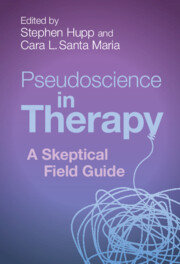Book contents
- Pseudoscience in Therapy
- Other Books
- Pseudoscience in Therapy
- Copyright page
- Dedication
- Contents
- Contributors
- Preface
- Acknowledgments
- 1 Thinking Critically about Therapy
- 2 Depression
- 3 Bipolar Spectrum
- 4 Anxiety
- 5 Obsessions and Compulsions
- 6 Trauma
- 7 Dissociation
- 8 Pain
- 9 Eating Issues
- 10 Insomnia
- 11 Sexual Issues
- 12 Substance Use and Addiction
- 13 Significant Cognitive Decline
- 14 Antisocial Behavior
- 15 Personality
- 16 Psychosis and Schizophrenia
- 17 Autism Spectrum and Intellectual Disability
- 18 Inattention and Hyperactivity
- 19 Tics
- 20 Couples Discord
- Postscript: Scientific Skepticism Resources
- Index
- References
18 - Inattention and Hyperactivity
Published online by Cambridge University Press: 16 March 2023
- Pseudoscience in Therapy
- Other Books
- Pseudoscience in Therapy
- Copyright page
- Dedication
- Contents
- Contributors
- Preface
- Acknowledgments
- 1 Thinking Critically about Therapy
- 2 Depression
- 3 Bipolar Spectrum
- 4 Anxiety
- 5 Obsessions and Compulsions
- 6 Trauma
- 7 Dissociation
- 8 Pain
- 9 Eating Issues
- 10 Insomnia
- 11 Sexual Issues
- 12 Substance Use and Addiction
- 13 Significant Cognitive Decline
- 14 Antisocial Behavior
- 15 Personality
- 16 Psychosis and Schizophrenia
- 17 Autism Spectrum and Intellectual Disability
- 18 Inattention and Hyperactivity
- 19 Tics
- 20 Couples Discord
- Postscript: Scientific Skepticism Resources
- Index
- References
Summary
This chapter describes pseudoscience and questionable ideas related to attention-deficit/hyperactivity disorder (ADHD). The chapter opens by discussing diagnostic changes and controversies such as adult-onset ADHD. Dubious treatments include neurofeedback, neurocognitive training, supplements, and cannabis-based products. The chapter closes by reviewing research-supported approaches.
Keywords
- Type
- Chapter
- Information
- Pseudoscience in TherapyA Skeptical Field Guide, pp. 297 - 311Publisher: Cambridge University PressPrint publication year: 2023

